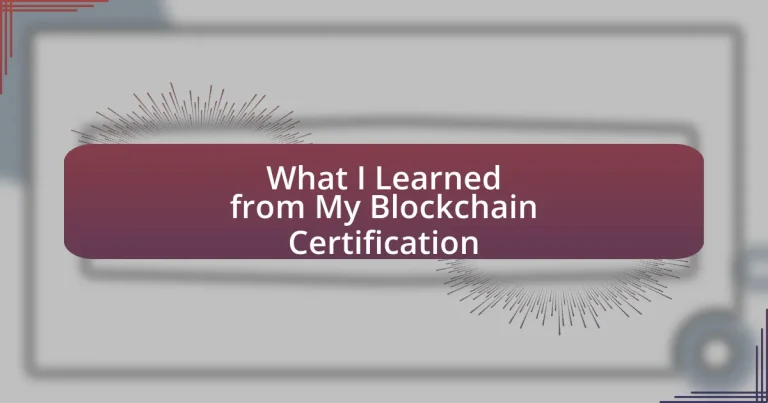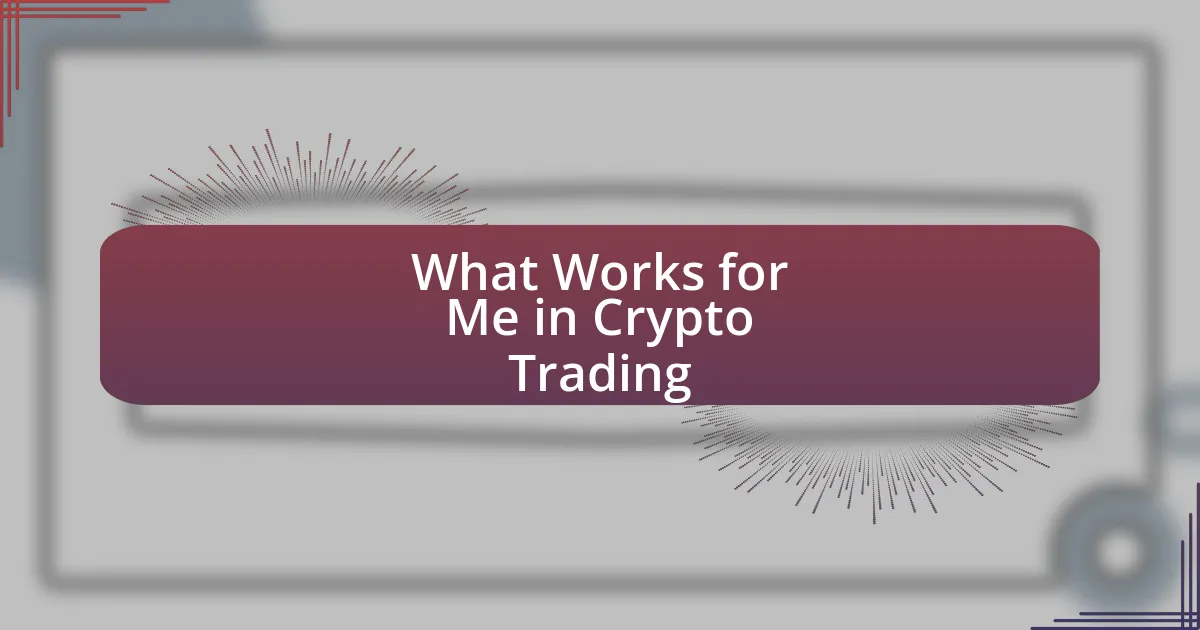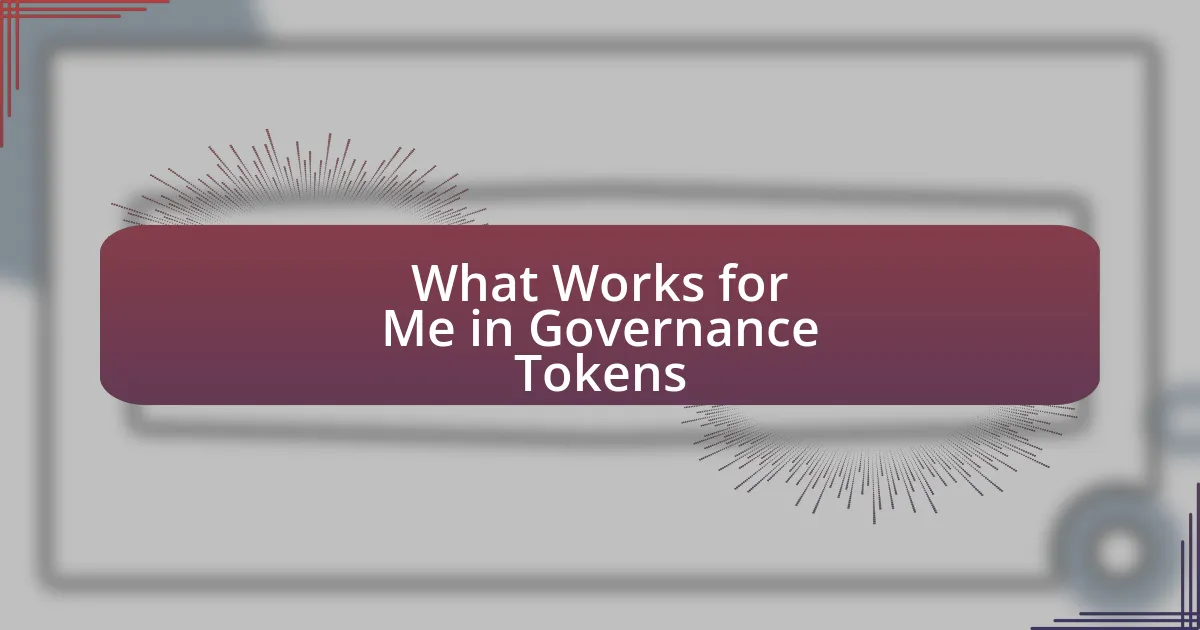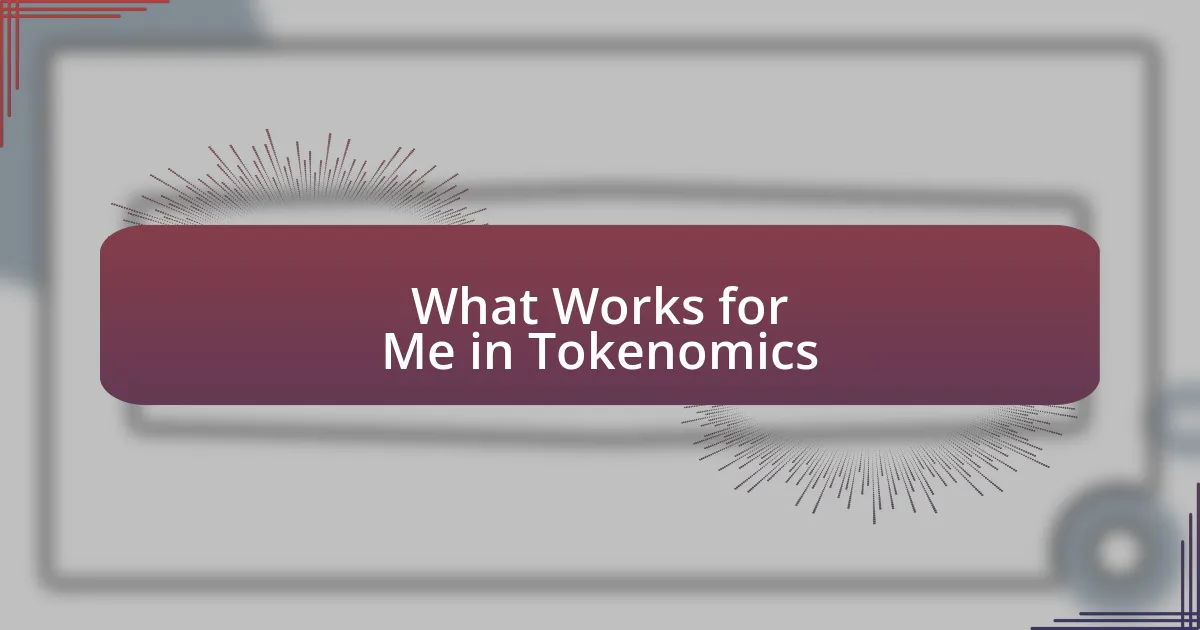Key takeaways:
- Blockchain certification enhances technical knowledge, confidence, and networking opportunities for professionals.
- Understanding blockchain is vital for career advancement, industry relevance, and practical application in real-world scenarios.
- The certification journey fosters key skills, including analytical abilities, cryptographic understanding, and effective communication.
- Future trends in blockchain education include immersive learning experiences and micro-credentialing, improving engagement and skill recognition.
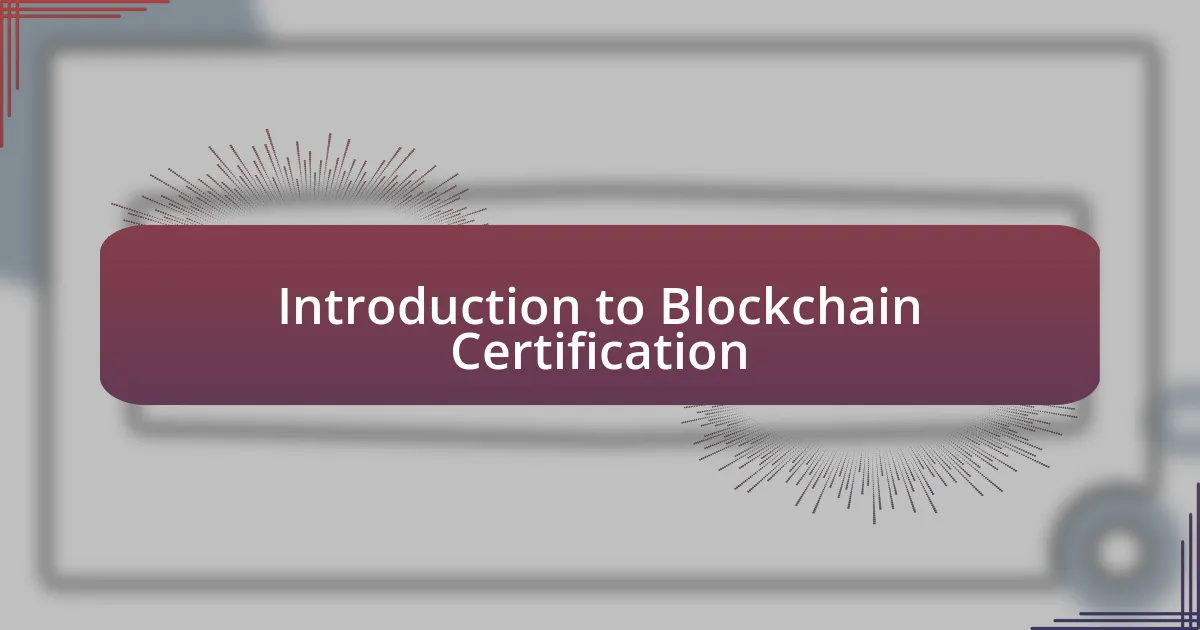
Introduction to Blockchain Certification
Blockchain certification has become a significant stepping stone for professionals wanting to deepen their understanding in this rapidly evolving field. I remember when I first stumbled upon the idea of blockchain—a notion that seemed complex and remote. What truly captivated me was the potential it holds to revolutionize various industries.
Pursuing a certification not only enhanced my technical knowledge but also expanded my network with like-minded individuals eager to explore the same innovative landscape. I often wonder how many opportunities I might have missed if I hadn’t taken that step. Each module I completed sparked a mix of excitement and curiosity, pushing me to grasp concepts that once felt daunting.
This journey through blockchain certification taught me more than just technicalities; it instilled a sense of confidence in navigating new technologies. Reflecting on it now, I realize that each lesson came with an emotional commitment to learning and a budding desire to apply these insights practically. Have you ever experienced a moment where learning transformed not just your skills but your whole outlook? That’s precisely what blockchain certification did for me.
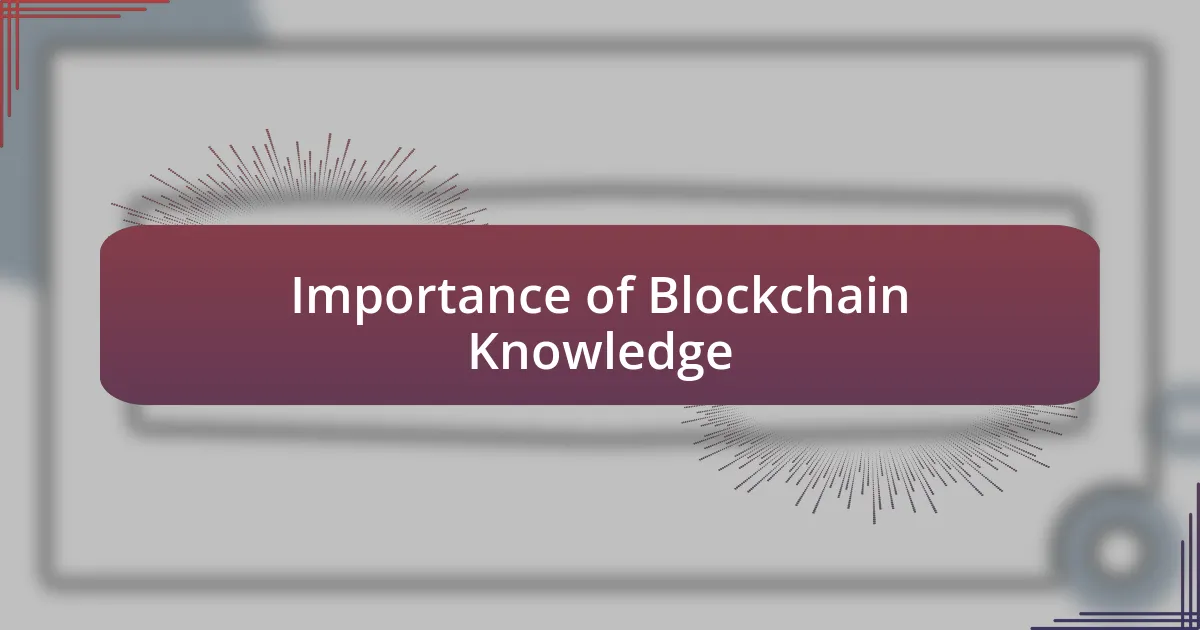
Importance of Blockchain Knowledge
Understanding blockchain is essential in today’s digital landscape. I often find myself reflecting on how this knowledge empowers me to engage in conversations about emerging technologies confidently. It’s not just about grasping the mechanics of blockchain; it’s about appreciating its role in securing data and fostering transparency across various sectors.
Here’s why blockchain knowledge is critical:
- Career Advancement: Professionals certified in blockchain can stand out in a competitive job market.
- Industry Relevance: Knowledge of blockchain provides insight into current trends, helping individuals stay relevant in their fields.
- Practical Application: Understanding the technology enables you to implement it in real-world scenarios, enhancing problem-solving skills.
- Networking Opportunities: Engaging with others in the blockchain space allows for connections that can lead to collaborative projects and insights.
As I navigated through my certification, each session unveiled new dimensions of how blockchain could solve real-world problems. I remember grappling with the concept of smart contracts at first; it felt like I had jumped into the deep end without a life vest. But as I delved deeper, that complexity turned into clarity, revealing how these contracts automate processes and reduce friction in transactions. This experience underscored to me just how crucial blockchain knowledge can be for driving change and innovation in my professional journey.
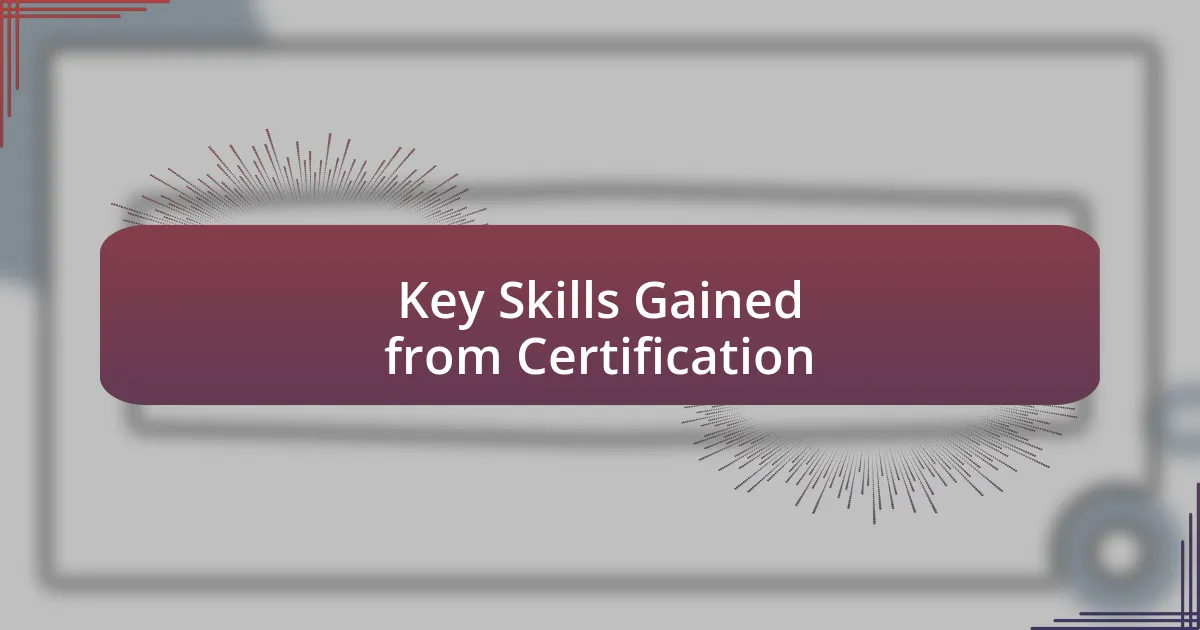
Key Skills Gained from Certification
Upon completing my blockchain certification, I found that my analytical skills were vastly improved. The coursework forced me to scrutinize complex problems from various angles, building my capacity to dissect intricate issues. I remember a specific project where I had to evaluate decentralized finance models, and that experience truly transformed my approach to problem-solving.
Another significant skill I acquired was a practical understanding of cryptographic principles. Initially, the concepts seemed daunting, almost like trying to learn a foreign language. But as I progressed, I realized that these principles are the backbone of security in blockchain. They are essential in safeguarding data, and I can confidently say that grasping this knowledge has made me more adept at identifying vulnerabilities in tech systems.
While engaging with peers during the certification, I honed my communication skills and learned to convey complex ideas in simple terms. One discussion about consensus algorithms stands out, as I felt the challenge of explaining these technicalities to someone unfamiliar with the topic. It pushed me to find creative ways to bridge that knowledge gap, and I emerged not only as a better communicator but also as a more empathetic collaborator.
| Skill | Description |
|---|---|
| Analytical Skills | Improved ability to dissect complex problems effectively, enhancing overall problem-solving capacity. |
| Cryptographic Understanding | Gained a practical understanding of cryptographic principles, crucial for ensuring data security. |
| Communication Skills | Enhanced ability to convey complex blockchain concepts in simple terms, fostering better collaboration. |
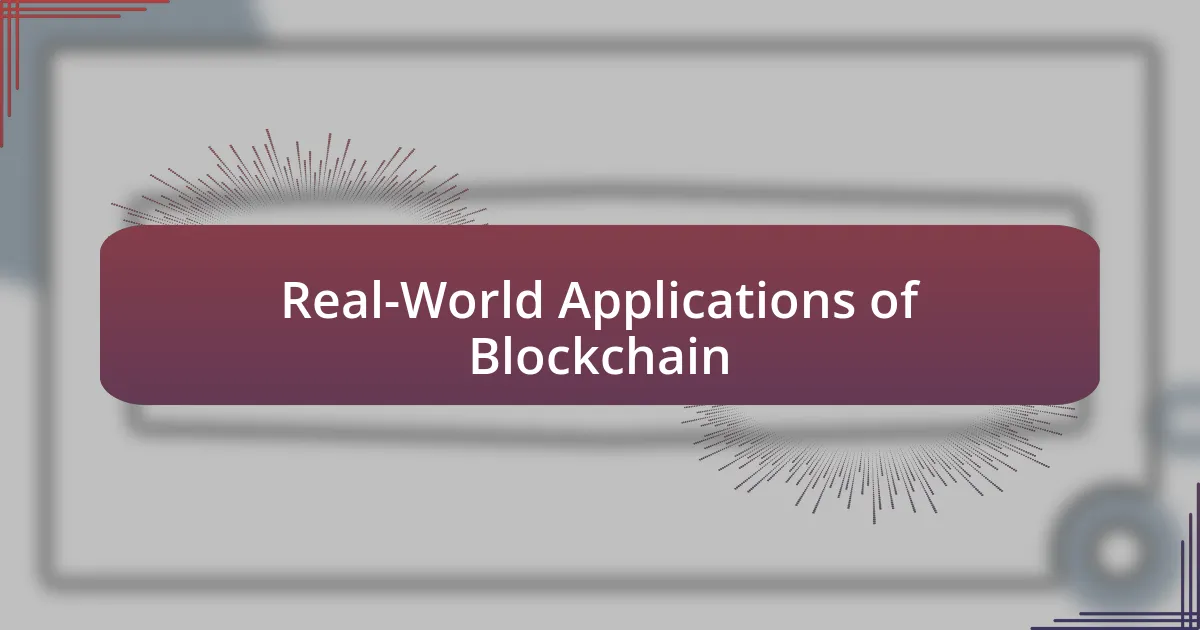
Real-World Applications of Blockchain
When I think about the real-world applications of blockchain, my mind immediately gravitates to supply chain management. I once spoke with a friend who works in logistics, and the way he described the potential for blockchain to enhance transparency and traceability was eye-opening. Imagine being able to track every single step a product takes, from the moment it leaves the factory to when it reaches your doorstep—how reassuring is that?
Another compelling use of blockchain lies in the realm of digital identity verification. I remember attending a workshop where the speaker discussed the challenges of identity theft and data breaches. The idea that blockchain technology could offer a decentralized and secure way to manage identities truly resonated with me. It made me wonder how many personal crises could be averted if we had reliable systems in place, allowing individuals to verify their identity without risking exposure of sensitive information.
Also, the financial sector has been rapidly evolving thanks to blockchain. I once participated in a seminar about decentralized finance (DeFi), where experts showcased how blockchain eliminates intermediaries in transactions, thus lowering costs and increasing efficiency. This insight left me pondering how accessible financial services could become for unbanked populations around the globe. The potential for inclusive financial systems excites me and underscores blockchain’s vital role in shaping our economic future.
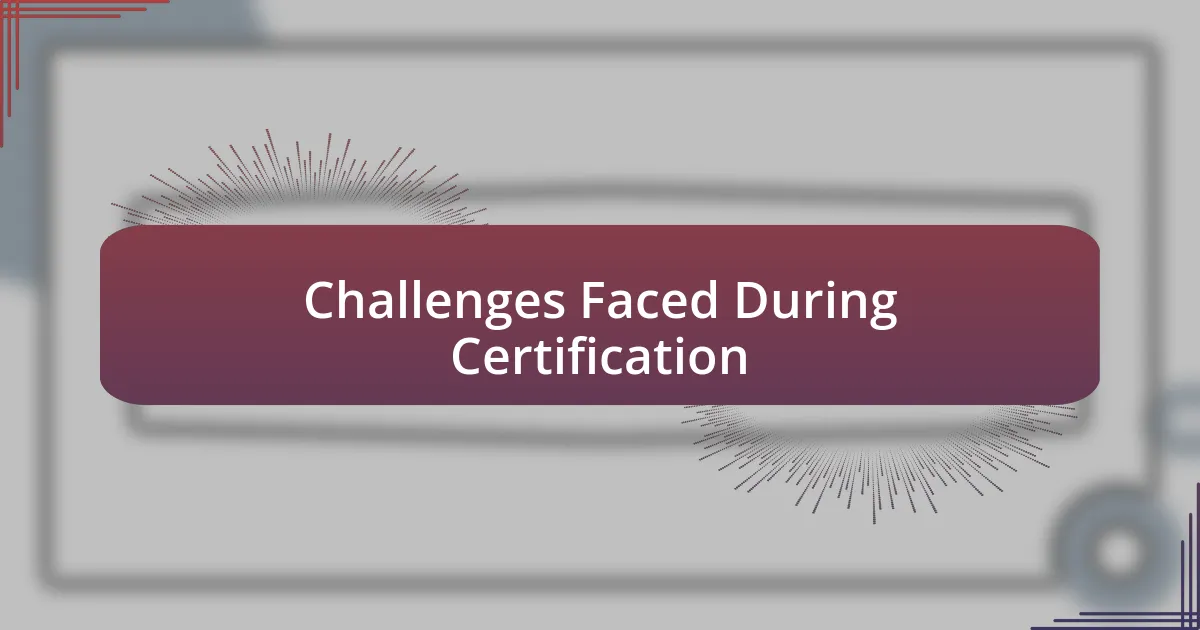
Challenges Faced During Certification
One of the biggest challenges I faced during my blockchain certification was the steep learning curve. The concepts often felt abstract and complex, like trying to grasp the fundamentals of a new language. I vividly recall spending late nights poring over technical jargon and foundational theories, feeling a mix of frustration and determination. Was it just me, or did everyone else also struggle to connect the dots?
Time management posed another hurdle. Between balancing my job and family commitments, I found it difficult to dedicate consistent study time. I often caught myself wondering if I was stretching myself too thin. However, I learned to prioritize my schedule, setting aside dedicated blocks for study, which helped me stay on track and ultimately fostered a sense of accomplishment.
Lastly, there were moments of self-doubt that crept in during group discussions and projects. While collaborating with peers, I sometimes felt out of my depth, especially when facing complex use cases or technical problems. It was humbling but also motivating; those experiences pushed me to seek help, ask questions, and engage more deeply with the material, reinforcing my understanding and connection to the blockchain community.
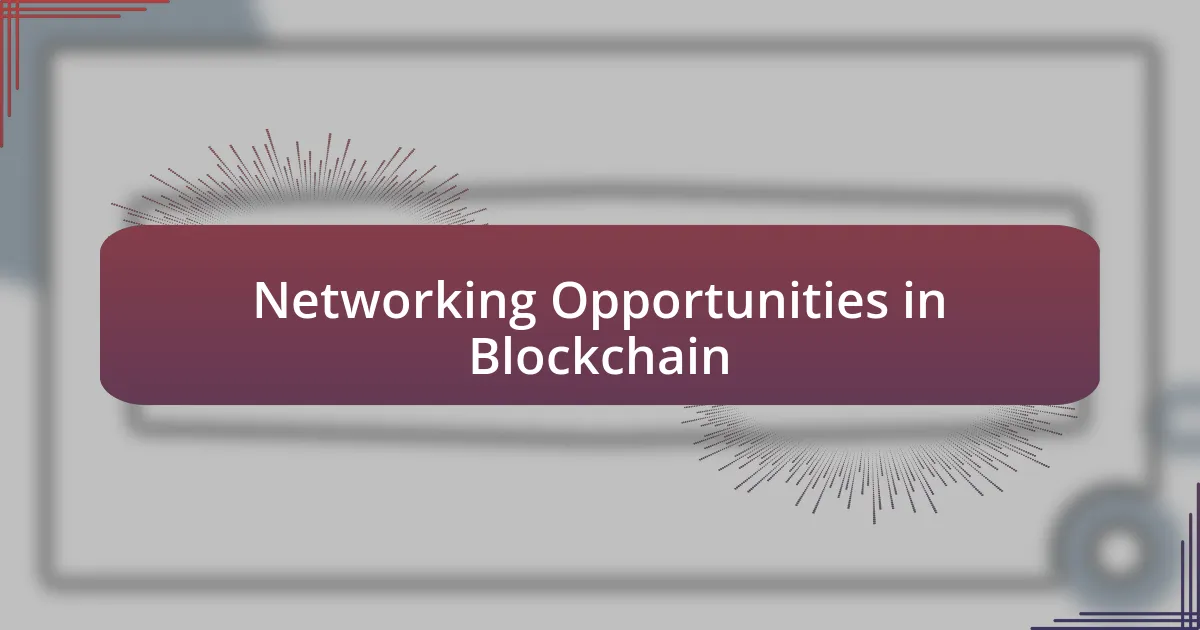
Networking Opportunities in Blockchain
Engaging with peers during my blockchain certification opened up a world of networking opportunities that I hadn’t anticipated. I joined online forums and local meetups, where I met individuals at various stages of their blockchain journey. One discussion that particularly stands out was with a seasoned developer who shared insights about real-world applications. It was illuminating, and I couldn’t help but wonder how many valuable connections I might miss if I hadn’t stepped out of my comfort zone.
The importance of networking became clear when I attended a blockchain conference. The energy in the room was palpable, and I found myself chatting with fellow attendees over coffee about shared interests and potential collaborations. Sometimes, I still think about that conversation with an entrepreneur exploring innovative solutions using blockchain. It made me realize that opportunities often lie in unexpected places, and you never know who might open a door for you simply by sharing your own experiences.
I also discovered that networking isn’t just about making connections; it’s about building relationships. After several months of interacting with my peers, I felt more confident reaching out for advice or sharing my challenges. Do you remember the last time you reached out for guidance? I’ll never forget when a fellow certifier offered me feedback on my project, which helped shape my understanding further. That act of support reinforced the collaborative spirit within the blockchain community, making me feel like I truly belonged.
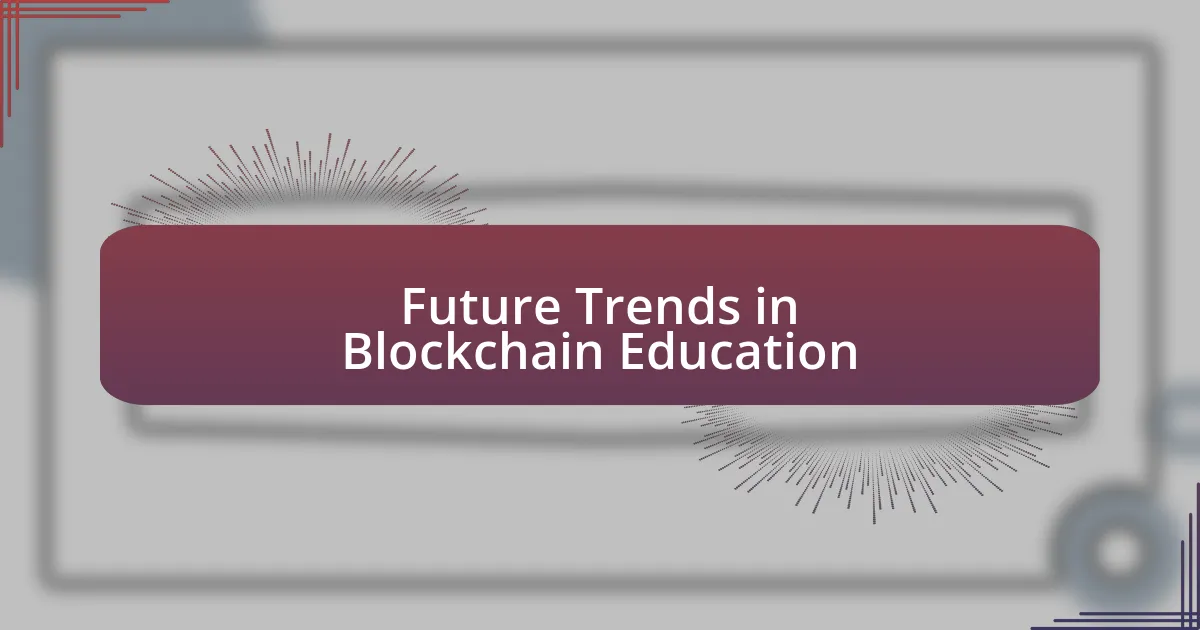
Future Trends in Blockchain Education
As I reflect on the future of blockchain education, one trend that truly captures my attention is the rise of immersive learning experiences. I can clearly see how virtual reality (VR) and augmented reality (AR) technologies are being integrated into blockchain courses. Imagine stepping into a virtual environment where you can simulate decentralized finance protocols—how powerful would that be? It’s easy to envision this kind of engagement fostering deeper understanding and retention of complex concepts.
Moreover, a significant focus is shifting towards micro-credentialing, allowing learners to showcase specific skills in blockchain. I remember experimenting with short courses that certified my knowledge of smart contracts. These bite-sized modules made it easier to learn on my own schedule and get recognized for my newfound capabilities. The convenience of such credentials can help learners of all backgrounds stay relevant in an ever-evolving field.
Another trend worth noting is the growing collaboration between educational institutions and industry leaders. When I took my certification course, I was amazed by how guest lectures from blockchain entrepreneurs enriched the curriculum. This partnership not only keeps the education up-to-date with real-world applications but also gives students insights into potential career paths. Have you considered how learning directly from industry experts can impact your understanding? From my experience, it opens doors to countless opportunities that traditional learning may not provide.

